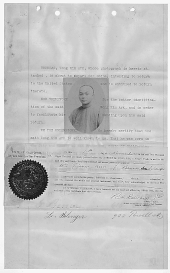黄金德
黄金德(Wong Kim Ark[1])出生于旧金山,各种来源表明他有可能是出生于1873年[2]、1871年[3]或1868年[4]。他的父亲黄四平(Wong Si Ping,音译)和母亲李薇(Wee Lee,音译)都是来自中国的移民,而二人皆非美国公民[5]:74[6]:51。黄金德在旧金山做厨师[7]。

1890年,黄金德到中国探亲,并于同年7月回美国,这一次他的美国身份没有受到质疑,所以一路平安无事。1894年11月,他再次搭船临时前往中国,但到了次年8月回国时,他被旧金山港的移民局人员拒绝入境并予以拘留。移民局人员认为黄金德虽然出生在美国境内,但由于他的父母都是中国人,所以他也应该是中国而非美国公民,根据美国排华法案无权入境。[8]
在中华公所法律代表的帮助下[9]:67,黄金德对拒绝承认他生来就是美国公民的人提出挑战,并向美国联邦地区法院发起人身保护令的呈请[10][11]。美国最高法院最终于1898年审理了他的案件,正式名称为 美国诉黄金德案(United States v. Wong Kim Ark)。根据《宪法》第十四条修正案,“所有在美国出生或归化并受其管辖的人”都被授予公民身份,法院必须裁定黄金德作为出生在美国的中国移民子女,是否拥有与生俱来的公民身份。
最高法院做出了有利于黄的裁决,指出他确实因出生而成为美国公民。法院的裁决确立了与生俱来的公民权原则,确认任何在美国领土上出生的人,无论其父母的移民身份或国籍如何,都自动成为美国公民。尽管最高法院在1889年的柴禅平诉合众国案曾裁决支持排华法案,黄氏案的判决对美国移民和公民权法律的形成起到了关键作用。这是向移民权利平等化迈出的重要一步,并强化了在美国土地上出生即获得公民身份的基本原则。
最高法院做出裁决后,黄金德继续过着私人生活。虽然他的案件产生了持久的影响,但他仍然相对默默无闻,直到20世纪后期及21世纪,他的故事作为“美国梦”和“出生公民权”重要性的象征得到更多认可。黄金德据信于1930年代或1940年代在中国逝世。[12] 作为最高法院一个具有里程碑意义的案件中的核心人物,他留下了一笔历史遗产,该案巩固了美国公民出生地原则。[13]
参考资料
[编辑]- ^ 转写自台山話发音:wong11 gim33 'ak3.
- ^ Wong Kim Ark, 169 U.S. at 649. "This was a writ of habeas corpus ... in behalf of Wong Kim Ark, who alleged that he ... was born at San Francisco in 1873 ...."
- ^ Affidavit signed by Wong Kim Ark on November 5, 1894. U.S. National Archives and Records Administration, San Bruno, California. (Wong gives his age as 23.)
- ^ First page of testimony given by Wong Kim Ark at an immigration hearing for his youngest son, Wong Yook Jim, on July 23, 1926. U.S. National Archives and Records Administration, San Bruno, California. (Wong Kim Ark gives his age as 57.)
- ^ Glen, Patrick J. Wong Kim Ark and Sentencia que Declara Constitucional la Ley General de Migración 285-04 in Comparative Perspective: Constitutional Interpretation, Jus Soli Principles, and Political Morality. University of Miami Inter-American Law Review. Fall 2007, 39 (1): 67–109. JSTOR 40176768.
- ^ Elinson, Elaine; Yogi, Stan. Wherever There's a Fight: How Runaway Slaves, Suffragists, Immigrants, Strikers and Poets Shaped Civil Liberties in California. Berkeley, CA: Heyday Books. 2009. ISBN 978-1-59714-114-7.
- ^ Davis, Lisa. The Progeny of Citizen Wong. SF Weekly. 1998-11-04 [2013-12-09]. (原始内容存档于2013-05-21).
Wong Kim Ark spent most of his life as a cook in various Chinatown restaurants. In 1894, Wong visited his family in China.
- ^ Wong Kim Ark, 169 U.S. at 650. "Because the said Wong Kim Ark, although born in the city and county of San Francisco, State of California, United States of America, is not, under the laws of the State of California and of the United States, a citizen thereof, the mother and father of the said Wong Kim Ark being Chinese persons and subjects of the Emperor of China, and the said Wong Kim Ark being also a Chinese person and a subject of the Emperor of China."
- ^ Salyer, Lucy E. Wong Kim Ark: The Contest Over Birthright Citizenship. Martin, David; Schuck, Peter (编). Immigration Stories. New York: Foundation Press. 2005. ISBN 1-58778-873-X.
- ^ Woodworth (1898), p. 556. "From this refusal to permit him to land, a writ of habeas corpus was sued out in the United States District Court .... [T]hat court discharged Wong Kim Ark on the ground that he was a citizen of the United States by virtue of his birth in this country, and that the Chinese Exclusion Acts were therefore inapplicable to him."
- ^ In re Wong Kim Ark, 71 F. 382 (页面存档备份,存于互联网档案馆) 互联网档案馆的存檔,存档日期2010-05-13. (N.D.Cal. 1896).
- ^ By Accident of Birth (2022). NPR. 2023-08-24 [2023-09-06]. (原始内容存档于2023-10-26).
- ^ How the Fight for Birthright Citizenship Shaped the History of Asian American Families: Even after Wong Kim Ark successfully took his case to the Supreme Court 125 years ago, Asian Americans struggled to receive recognition as U.S. citizens. 史密森尼 (雜誌). 2023-03-27 [2023-09-03]. (原始内容存档于2023-09-03).
相关条目
[编辑]
| ||||||||||||||||||||||||||||||||||||||||||||||||||||||||||||||||||||||||||||
| ||||||||||||
